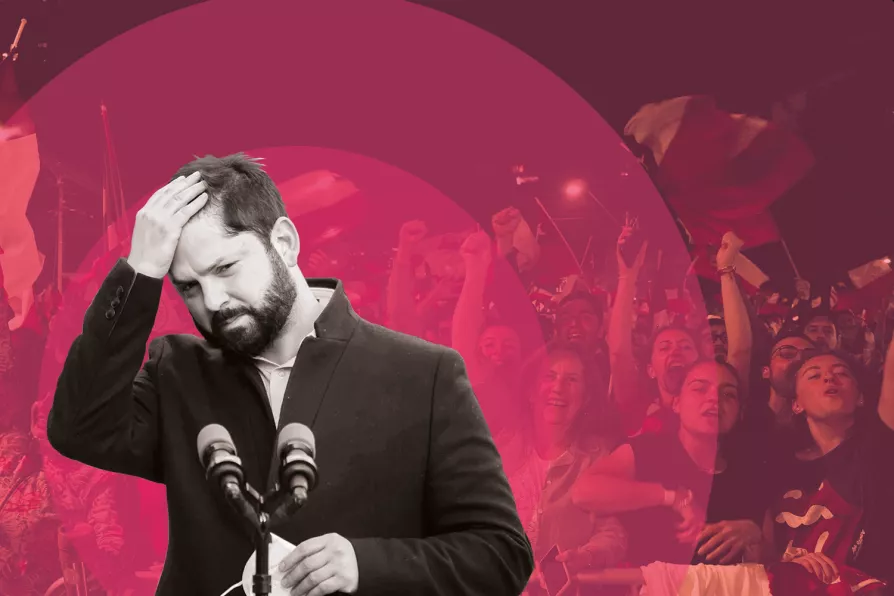SOLOMON HUGHES reveals how six MPs enjoyed £400-£600 hospitality at Ditchley Park for Google’s ‘AI parliamentary scheme’ — supposedly to develop ‘effective scrutiny’ of artificial intelligence, but actually funded by the increasingly unsavoury tech giant itself

 MAJOR SETBACK: The right has celebrated the defeat of President Gabriel Boric’s proposed progressive new constitution
MAJOR SETBACK: The right has celebrated the defeat of President Gabriel Boric’s proposed progressive new constitution
Hugo Guzman: How do you respond to the questioning of the work of the constitutional commission members to the point of blaming them for the victory of the vote to reject the proposed new constitution?
Marcos Barraza: The defeat of the “Apruebo” campaign — the “approve” vote — does not have just one single explanation. It requires a rigorous analysis, bearing in mind that this is a struggle that neither ends nor concludes with this defeat.
I believe that because the social impetus and the expectation of a new constitution to replace the one foisted by the dictatorship is still in force that the reasons for the defeat are important to grasp.
Then can you explain these reasons?
The first is not to ignore the fact that there was a national majority that did not feel adequately represented in the draft of the new constitution; this is a fact, a reality which remains to be analysed in more detail.
Second, I believe that we should not overlook a multimillion-dollar campaign by the right wing that shamelessly and continuously lied about the actual contents of the draft constitution, effectively obscuring the positive attributes of the text. The vast majority of people just accepted the lies at face value without bothering to look at what was actually being proposed.
There was excessive and irregular financing of the rejection campaign by the dominant economic groups in the country, particularly the privatised pension funds which circumnavigated legal restrictions on political donations.
Third and perhaps decisive was the right-wing systematic campaign to undermine the legitimacy of the constitutional commission itself, which started as soon as that body was democratically elected. Needless to say, some of this was accentuated by individual errors that occurred during the commission’s work and led to a loss of institutional credibility.
The Apruebo campaign was not free from mistakes either and if you add to it the cost-of-living crisis that has hit families and workers in general very hard and the added insecurity stemming from high crime rates, the frustration, disenchantment and unease, are simple to understand. All this affected the voting very directly indeed.
The victims of the result of the plebiscite are, however, the people of Chile. The just demands for free and better education, for guaranteed equal access to healthcare, for decent pensions, for rights got working women and a constitutional recognition of domestic work, a democratic state with a bill of rights — these are all being left by the wayside, unresolved or pending — and this will undoubtedly hurt the people.
As the Communist Party we must have the fortitude we had on many other occasions, to quickly — because events are rushing ahead — put these transformations at the centre of our work and campaigning. The text of the new constitution has to inform our strategy for action.
Is there not a danger that, given what has happened, with the high percentage of rejection of the proposed text (61.86 per cent of the vote), there will be a drive to look to parliament or a group of experts to draw up the new constitutional project?
Evidently, the right wing and those who campaigned for rejection feel they can impose their terms and conditions. The discussion on the mechanism that will enable a new constitutional commission to be formed is key in terms of maintaining unalterable democratic principles, securing the participation of indigenous people and including gender parity.
There is a vast democratic deficit in the current constitution. The problems of democracy are solved with more democracy — and to try to impose a new commission comprising, as it’s been suggested, technicians and technocrats over the will of the people, would be a major political mistake.
It looks, given what you say, it will be difficult for proper discussions to take place in a hung parliament.
Yes, without a doubt. The right wing is going to try to impose a nominal, rubber-stamping exercise, much like the one that led, in the past, to the approval of the military junta’s constitutional project, which is the constitution Chile has today.
Unity and a firm democratic perspective are now a key requirement for the forces of transformation.
Marcos Barraza was a member of the Chilean constitutional commission and former minister of social development in the second Michelle Bachelet government.
Hugo Guzman is the editor of El Siglo newspaper — www.elsiglo.cl.

















